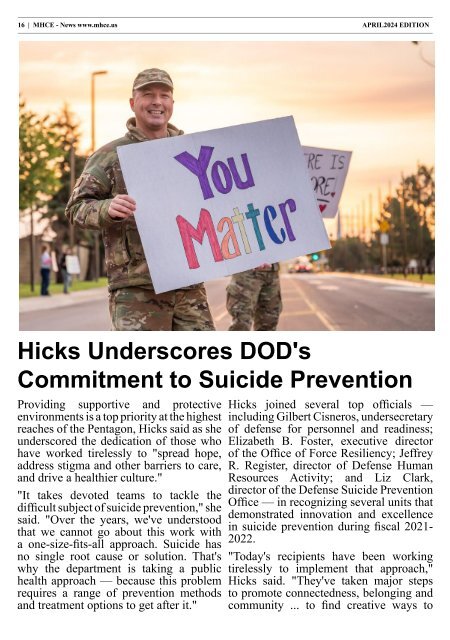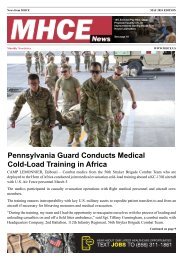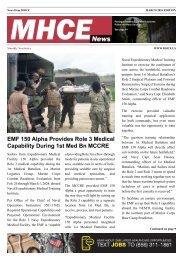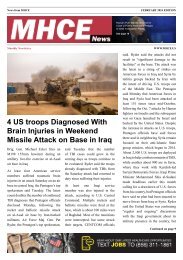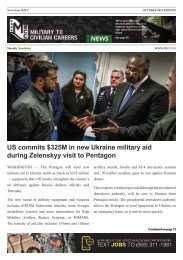MHCE APRIL 2024
You also want an ePaper? Increase the reach of your titles
YUMPU automatically turns print PDFs into web optimized ePapers that Google loves.
16 | <strong>MHCE</strong> - News www.mhce.us <strong>APRIL</strong><strong>2024</strong> EDITION WWW.<strong>MHCE</strong>.US<br />
Monthly Newsletter | 17<br />
Hicks Underscores DOD's<br />
Commitment to Suicide Prevention<br />
Providing supportive and protective<br />
environments is a top priority at the highest<br />
reaches of the Pentagon, Hicks said as she<br />
underscored the dedication of those who<br />
have worked tirelessly to "spread hope,<br />
address stigma and other barriers to care,<br />
and drive a healthier culture."<br />
"It takes devoted teams to tackle the<br />
difficult subject of suicide prevention," she<br />
said. "Over the years, we've understood<br />
that we cannot go about this work with<br />
a one-size-fits-all approach. Suicide has<br />
no single root cause or solution. That's<br />
why the department is taking a public<br />
health approach — because this problem<br />
requires a range of prevention methods<br />
and treatment options to get after it."<br />
Hicks joined several top officials —<br />
including Gilbert Cisneros, undersecretary<br />
of defense for personnel and readiness;<br />
Elizabeth B. Foster, executive director<br />
of the Office of Force Resiliency; Jeffrey<br />
R. Register, director of Defense Human<br />
Resources Activity; and Liz Clark,<br />
director of the Defense Suicide Prevention<br />
Office — in recognizing several units that<br />
demonstrated innovation and excellence<br />
in suicide prevention during fiscal 2021-<br />
2022.<br />
"Today's recipients have been working<br />
tirelessly to implement that approach,"<br />
Hicks said. "They've taken major steps<br />
to promote connectedness, belonging and<br />
community ... to find creative ways to<br />
promote new and available health care<br />
options."<br />
Those units receiving the recognition<br />
include U.S. Army Garrison Rheinland-<br />
Pfalz in Kaiserlautern, Germany; Guam<br />
Army National Guard in Barrigada, Guam;<br />
Marine Aircraft Group 12 in Iwakuni,<br />
Japan; Naval Special Warfare U.S. Special<br />
Operations Command in San Diego; and<br />
Air Force Air Combat Command jointly<br />
with Joint Base Langley-Eustis in Hampton<br />
and Newport News, Virginia.<br />
"Our honorees' work on suicide prevention<br />
has been more than conceptual," Hicks<br />
said. "They've launched campaigns to get<br />
the word out on life-changing information.<br />
They've organized outreach events to<br />
increase awareness. They've helped<br />
match people to the community support<br />
systems that best suit their needs. And<br />
they've nurtured connectedness at every<br />
level — from individuals to the squadron,<br />
command, and battalion levels — to help<br />
save lives.<br />
"These programs, and the people who<br />
implement and manage them, have made<br />
the fight against suicide a top priority," she<br />
said.<br />
In recognition of September as National<br />
Suicide Prevention and Awareness Month,<br />
DOD has launched its 2023-<strong>2024</strong> annual<br />
campaign, titled "Connect to Protect:<br />
Support is within Reach."<br />
In his remarks during the recognition<br />
ceremony, Cisneros emphasized the<br />
importance of establishing healthy<br />
connections and relationships in suicide<br />
prevention.<br />
"There is often a sense among the military<br />
community and among service members<br />
that they need to be strong and fully<br />
capable at all times," he said. "They<br />
believe strength is enduring their lowest<br />
moments, and darkest thoughts alone. But<br />
nothing could be further from the truth.<br />
"We recognize that asking for help is<br />
challenging, but we are making it easier<br />
to get help in the military community<br />
by creating connections through local<br />
programing," he said. "We help by saying<br />
we are here for you. We help by creating<br />
supportive and protective environments.<br />
That is our goal and one which we must<br />
continue to strive towards."<br />
While stationed in the 48 contiguous states,<br />
service members, veterans and family<br />
members in crisis can seek help through<br />
the veterans/military crisis line by:<br />
Calling 988 and accessing option 1.<br />
Texting to 838255.<br />
Chatting at VeteransCrisisLine.net/Chat.<br />
Those stationed outside of the U.S. can<br />
access the crisis line by:<br />
Calling 00800 1273 8255 or<br />
DSN 118 in Europe.<br />
Calling 080-855-5118 or<br />
DSN 118 in Japan and Korea.<br />
Dialing 1-800 273-8255 or<br />
DSN 111 in Afghanistan.<br />
To access noncrisis support, service<br />
members and their immediate family<br />
members can connect with Military<br />
OneSource for free access to confidential<br />
counseling.<br />
Mental health and counseling services are<br />
also available through Tricare.<br />
DOD civilian employees can access<br />
resources, information and confidential<br />
help by calling 1-866-580-9046.


